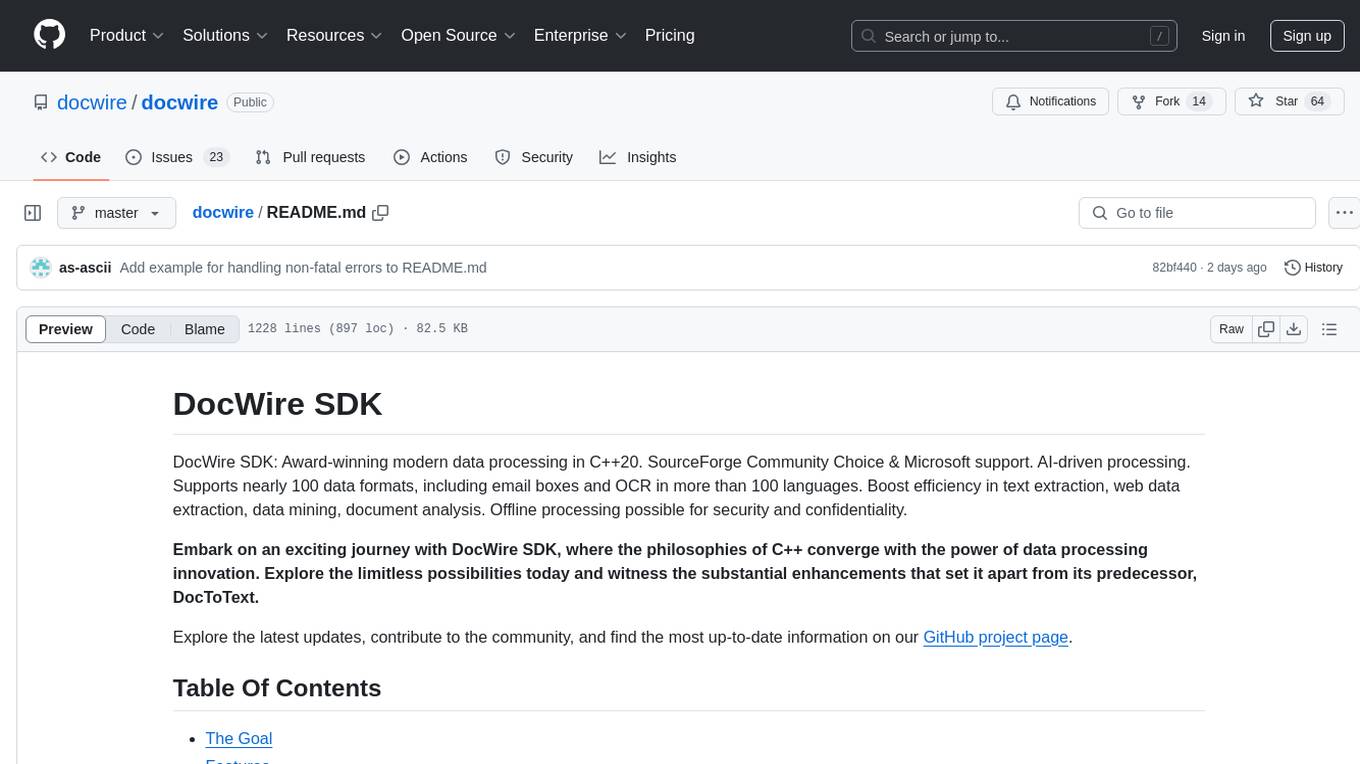
AgentConnect
Our vision is to provide communication capabilities for intelligent agents, allowing them to connect with each other to form a collaborative network of intelligent agents.
Stars: 54
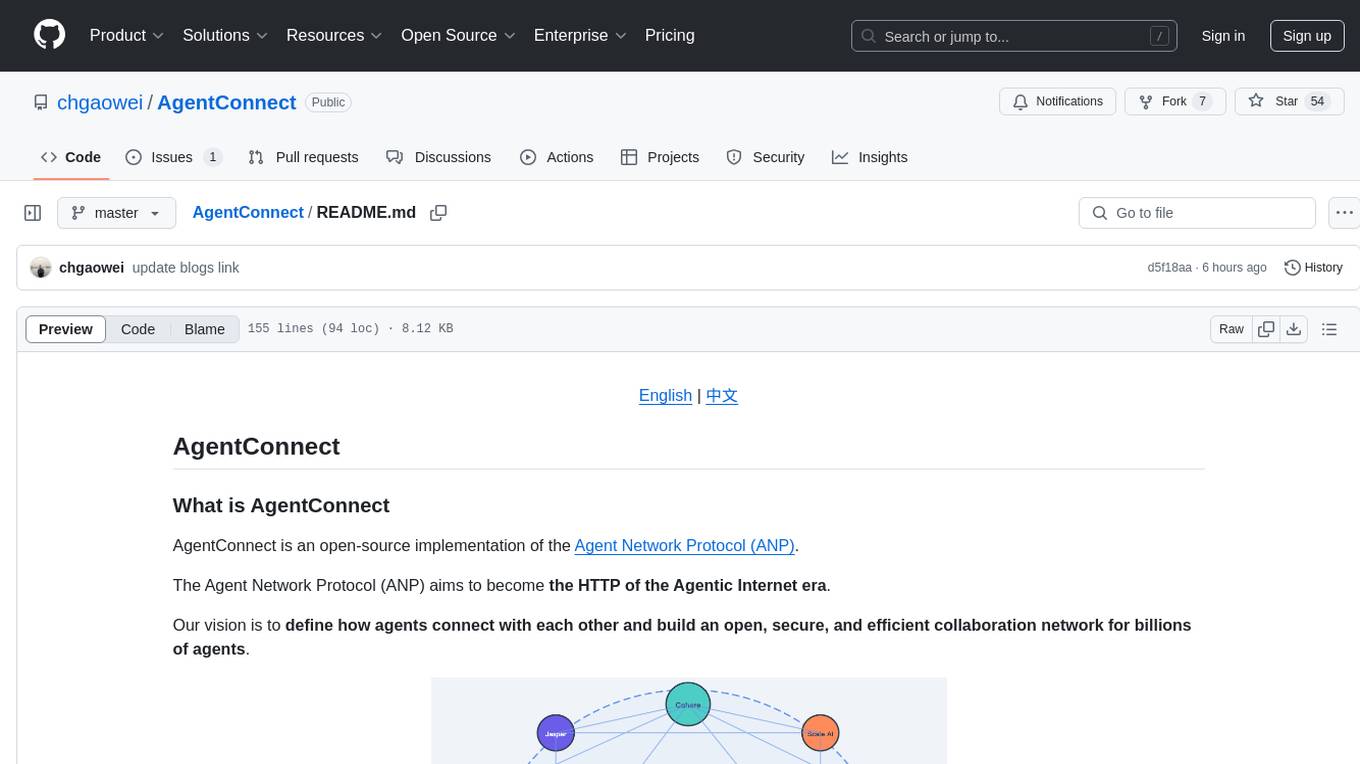
AgentConnect is an open-source implementation of the Agent Network Protocol (ANP) aiming to define how agents connect with each other and build an open, secure, and efficient collaboration network for billions of agents. It addresses challenges like interconnectivity, native interfaces, and efficient collaboration. The architecture includes authentication, end-to-end encryption modules, meta-protocol module, and application layer protocol integration framework. AgentConnect focuses on performance and multi-platform support, with plans to rewrite core components in Rust and support mobile platforms and browsers. The project aims to establish ANP as an industry standard and form an ANP Standardization Committee. Installation is done via 'pip install agent-connect' and demos can be run after cloning the repository. Features include decentralized authentication based on did:wba and HTTP, and meta-protocol negotiation examples.
README:
AgentConnect is an open-source implementation of the Agent Network Protocol (ANP).
The Agent Network Protocol (ANP) aims to become the HTTP of the Agentic Internet era.
Our vision is to define how agents connect with each other and build an open, secure, and efficient collaboration network for billions of agents.
While current internet infrastructure is well-established, there's still a lack of optimal communication and connection solutions for the specific needs of agent networks. We are committed to addressing three major challenges faced by agent networks:
- 🌐 Interconnectivity: Enable communication between all agents, break down data silos, and allow AI to access complete contextual information.
- 🖥️ Native Interfaces: AI shouldn't have to mimic human internet interactions; it should interact with the digital world through its most proficient methods (APIs or communication protocols).
- 🤝 Efficient Collaboration: Leverage AI for self-organizing and self-negotiating agents to build a more cost-effective and efficient collaboration network than the existing internet.
The technical architecture of AgentConnect is illustrated below:
Corresponding to the three-layer architecture of the Agent Network Protocol, AgentConnect primarily includes:
-
🔒 Authentication and End-to-End Encryption Modules Implements W3C DID-based authentication and end-to-end encrypted communication, including DID document generation, verification, retrieval, and end-to-end encryption based on DID and ECDHE (Elliptic Curve Diffie-Hellman Ephemeral). Currently supports HTTP-based DID authentication.
-
🌍 Meta-Protocol Module Built on LLM (Large Language Models) and meta-protocols, this module handles application protocol negotiation, protocol code implementation, protocol debugging, and protocol processing.
-
📡 Application Layer Protocol Integration Framework Manages protocol specifications and code for communication with other agents, including protocol loading, unloading, configuration, and processing. This framework enables agents to easily load and run required protocols on demand, accelerating protocol negotiation.
Beyond these features, AgentConnect will focus on performance and multi-platform support:
- Performance: As a fundamental codebase, we aim to provide optimal performance and plan to rewrite core components in Rust.
- Multi-Platform: Currently supports Mac, Linux, and Windows, with future support for mobile platforms and browsers.
- Learn more about AgentNetworkProtocol: Agent Network Protocol (ANP)
- For our overall design philosophy, check our technical whitepaper: AgentNetworkProtocol Technical White Paper
Here are some of our blogs:
-
This is our understanding of the agent network: What's Different About the Agentic Web
-
A brief introduction to did:wba: did:wba - Web-Based Decentralized Identifiers
-
We compared the differences between did:wba and technologies like OpenID Connect and API keys: Comparison of did:wba with OpenID Connect and API keys
-
We analyzed the security principles of did:wba: Security Principles of did:wba
-
Three Technical Approaches to AI-Internet Interaction: Three Technical Approaches to AI-Internet Interaction
Both protocol and implementation development follow this progression:
- [x] Build authentication and end-to-end encrypted communication protocol and implementation. This foundational core is essentially complete.
- [x] Meta-protocol design and implementation. Protocol design and code development are basically complete.
- [ ] Application layer protocol design and development. Currently in progress.
To establish ANP as an industry standard, we plan to form an ANP Standardization Committee at an appropriate time, working towards recognition by international standardization organizations like W3C.
pip install agent-connectAfter installing the agent-connect library, you can run our demos to experience its capabilities.
Clone the repository:
git clone https://github.com/chgaowei/AgentConnect.gitdid:wba is a Web-based Decentralized Identifier. More information: did:wba, a Web-based Decentralized Identifier.
Our latest version supports decentralized authentication based on did:wba and HTTP. We provide a did:wba server for testing. Server API documentation: did:wba Server Test API Documentation.
Example code path: examples/did_wba_examples. Including:
- basic.py: A basic example of DID WBA authentication. Creates a DID document and private key, uploads the DID document to the server, and tests DID authentication.
- full.py: Builds on basic.py, adding token verification and DID document validation.
- client.py: A client example for testing if your server supports DID WBA authentication, using pre-created DID documents and private keys.
Run these files directly to experience DID WBA authentication:
python basic.py
python full.py
python client.pyYou can also experience DID WBA authentication through our demo page: DID WBA Authentication Page. This page demonstrates the process of creating a DID identity on one platform (pi-unlimited.com) and then verifying the identity on another platform (service.agent-network-protocol.com).
We support meta-protocol negotiation where Alice and Bob first negotiate a protocol, generate processing code, and then communicate using the protocol code.
Run the demo code in examples/negotiation_mode directory. Start Bob's node first, then Alice's node.
- Start Bob's node
python negotiation_bob.py- Start Alice's node
python negotiation_alice.pyThe logs will show successful connection, protocol negotiation, code generation, and data communication between Alice and Bob.
Note: Meta-protocol negotiation requires Azure OpenAI API configuration (currently only supports Azure OpenAI). Configure these environment variables in the ".env" file in the project root: AZURE_OPENAI_API_KEY, AZURE_OPENAI_ENDPOINT, AZURE_OPENAI_DEPLOYMENT, AZURE_OPENAI_MODEL_NAME
Author: Gaowei Chang
Email: [email protected]
- Discord: https://discord.gg/SuXb2pzqGy
- Website: https://agent-network-protocol.com/
- GitHub: https://github.com/chgaowei/AgentNetworkProtocol
- WeChat: flow10240
Contributions are welcome! Please see CONTRIBUTING.md for details.
This project is open-sourced under the MIT License. See the LICENSE file for details.
For Tasks:
Click tags to check more tools for each tasksFor Jobs:
Alternative AI tools for AgentConnect
Similar Open Source Tools

AgentConnect
AgentConnect is an open-source implementation of the Agent Network Protocol (ANP) aiming to define how agents connect with each other and build an open, secure, and efficient collaboration network for billions of agents. It addresses challenges like interconnectivity, native interfaces, and efficient collaboration. The architecture includes authentication, end-to-end encryption modules, meta-protocol module, and application layer protocol integration framework. AgentConnect focuses on performance and multi-platform support, with plans to rewrite core components in Rust and support mobile platforms and browsers. The project aims to establish ANP as an industry standard and form an ANP Standardization Committee. Installation is done via 'pip install agent-connect' and demos can be run after cloning the repository. Features include decentralized authentication based on did:wba and HTTP, and meta-protocol negotiation examples.
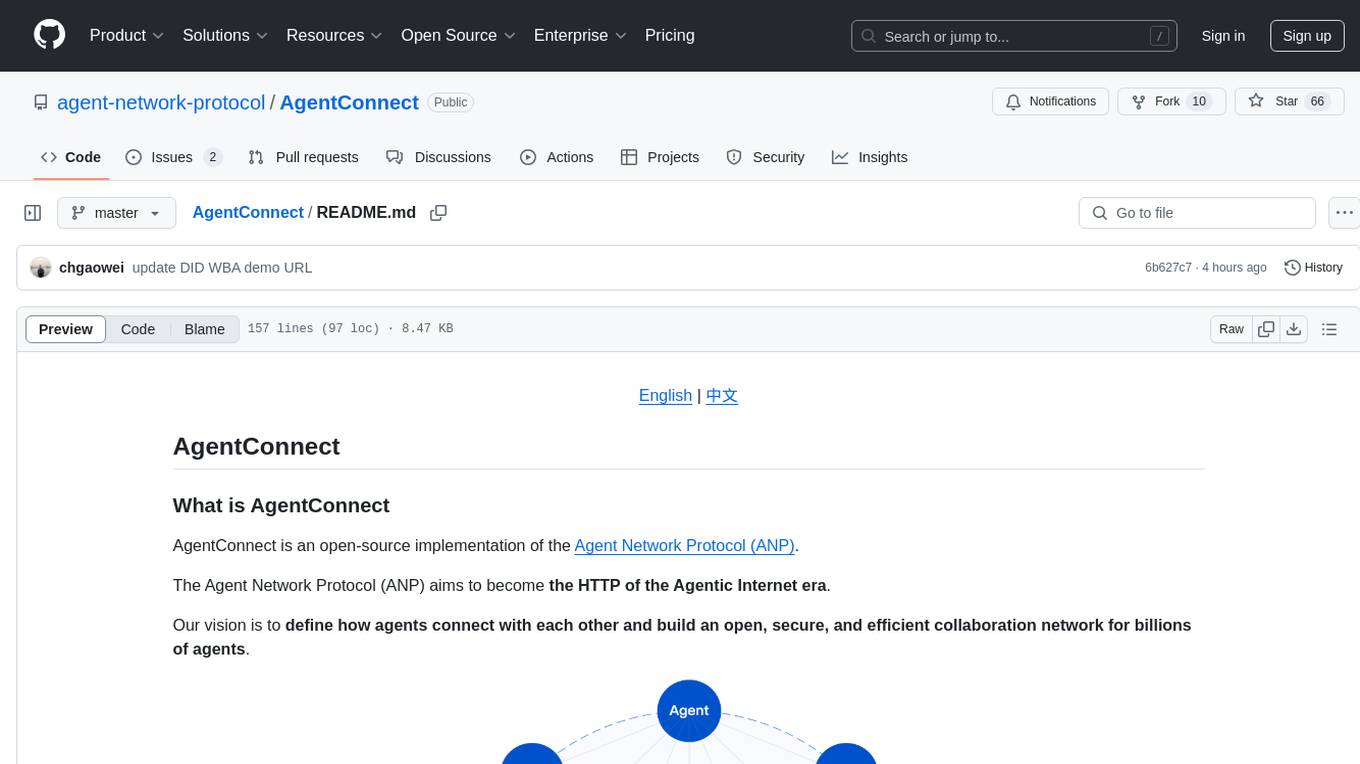
AgentConnect
AgentConnect is an open-source implementation of the Agent Network Protocol (ANP) aiming to define how agents connect with each other and build an open, secure, and efficient collaboration network for billions of agents. It addresses challenges like interconnectivity, native interfaces, and efficient collaboration by providing authentication, end-to-end encryption, meta-protocol handling, and application layer protocol integration. The project focuses on performance and multi-platform support, with plans to rewrite core components in Rust and support Mac, Linux, Windows, mobile platforms, and browsers. AgentConnect aims to establish ANP as an industry standard through protocol development and forming a standardization committee.
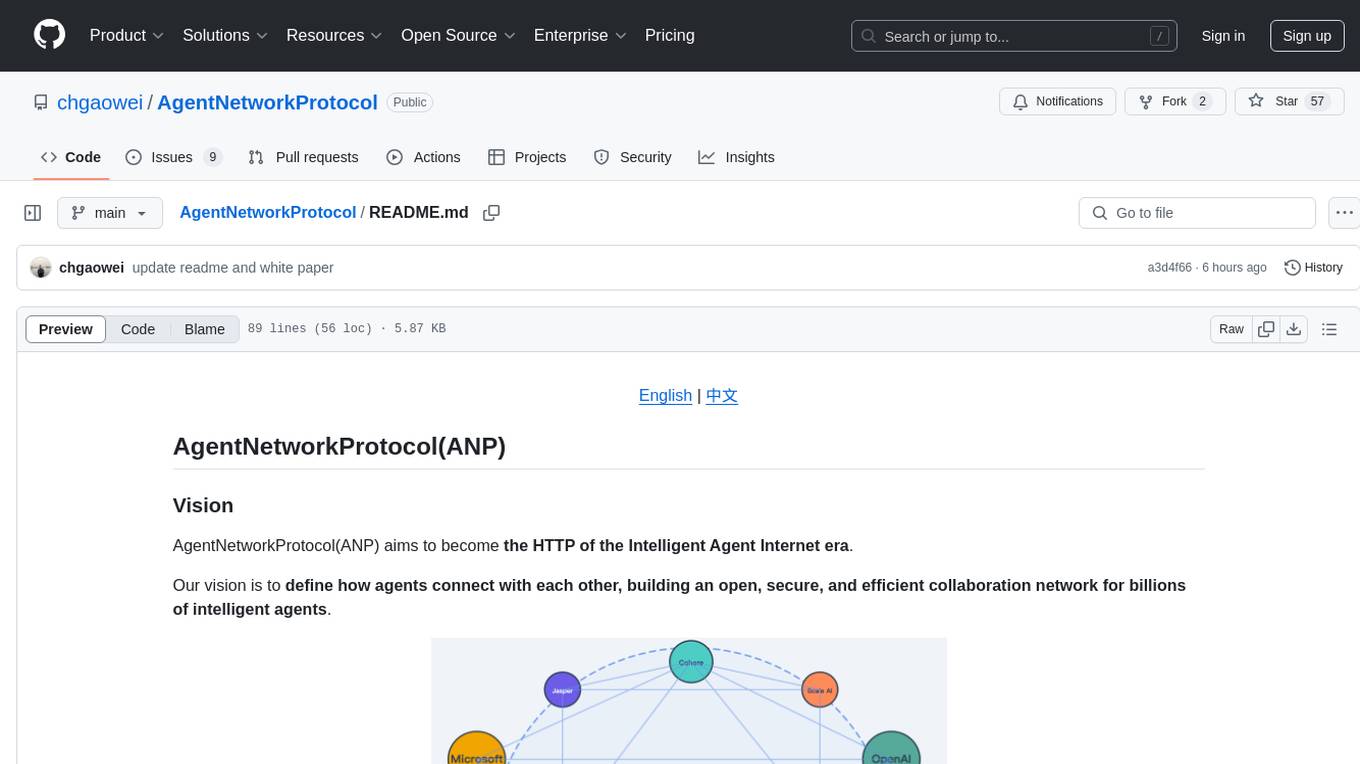
AgentNetworkProtocol
AgentNetworkProtocol (ANP) aims to define how agents connect with each other, building an open, secure, and efficient collaboration network for billions of intelligent agents. It addresses challenges in interconnectivity, native interfaces, and efficient collaboration by providing protocol layers for identity and encrypted communication, meta-protocol negotiation, and application protocol management. The project is developing an open-source implementation available on GitHub, with a vision to become the HTTP of the Intelligent Agent Internet era and establish ANP as an industry standard through a standardization committee. Contact the author Gaowei Chang via email, Discord, website, or GitHub for contributions or inquiries.
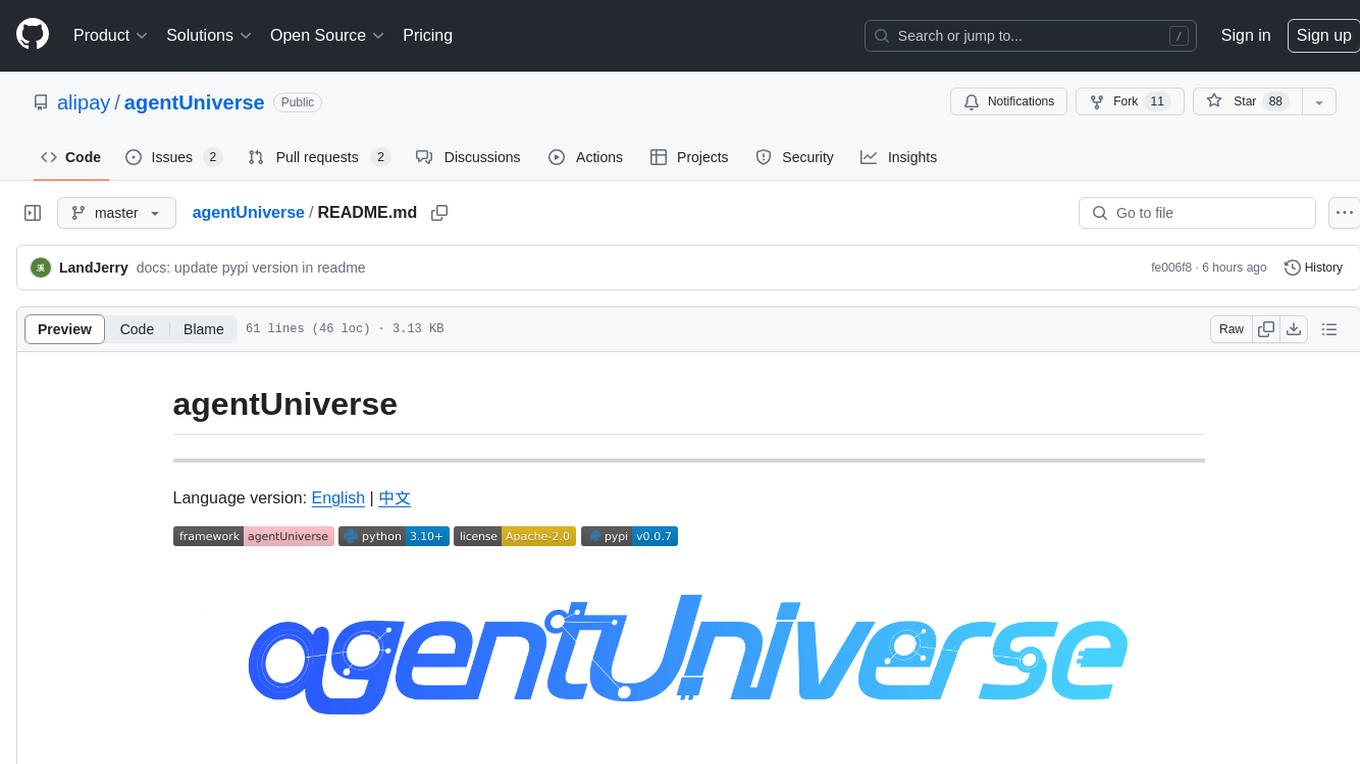
agentUniverse
agentUniverse is a framework for developing applications powered by multi-agent based on large language model. It provides essential components for building single agent and multi-agent collaboration mechanism for customizing collaboration patterns. Developers can easily construct multi-agent applications and share pattern practices from different fields. The framework includes pre-installed collaboration patterns like PEER and DOE for complex task breakdown and data-intensive tasks.
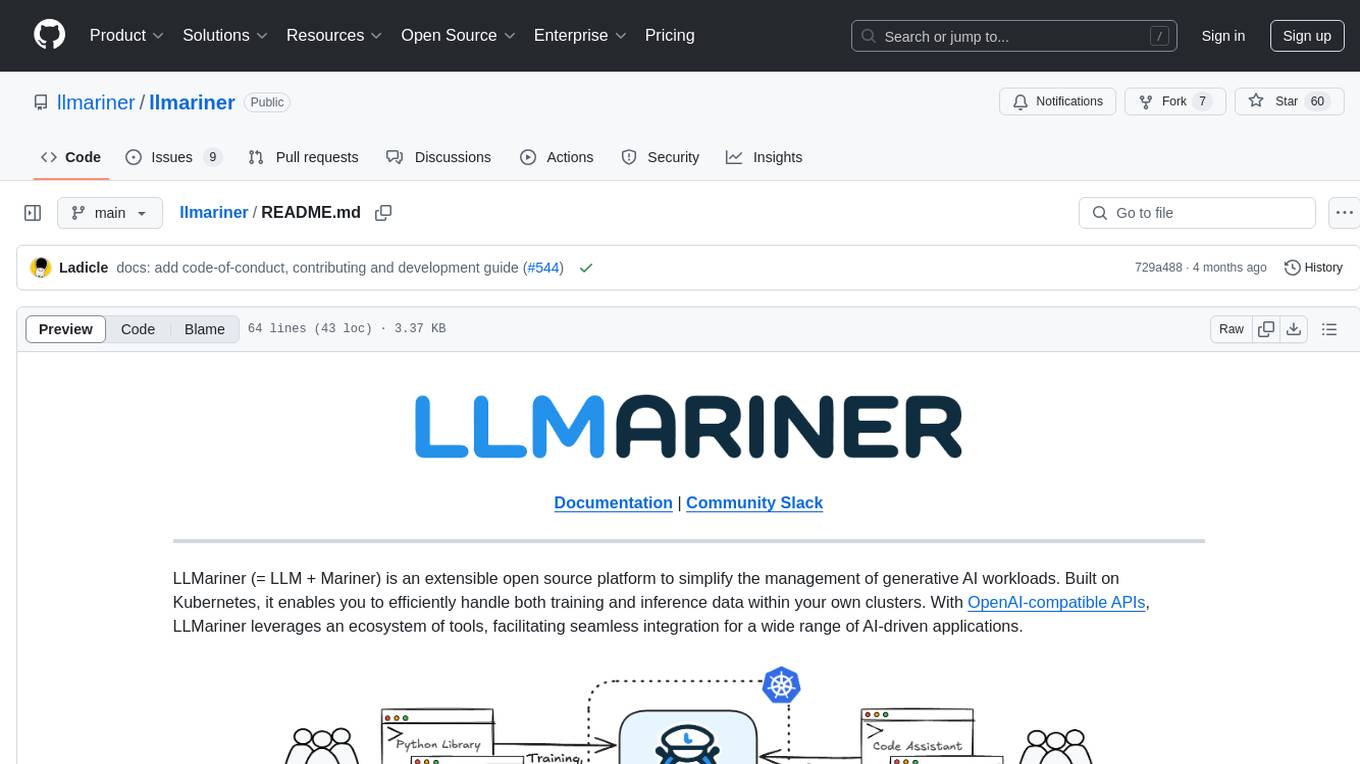
llmariner
LLMariner is an extensible open source platform built on Kubernetes to simplify the management of generative AI workloads. It enables efficient handling of training and inference data within clusters, with OpenAI-compatible APIs for seamless integration with a wide range of AI-driven applications.

CodeFuse-muAgent
CodeFuse-muAgent is a Multi-Agent framework designed to streamline Standard Operating Procedure (SOP) orchestration for agents. It integrates toolkits, code libraries, knowledge bases, and sandbox environments for rapid construction of complex Multi-Agent interactive applications. The framework enables efficient execution and handling of multi-layered and multi-dimensional tasks.
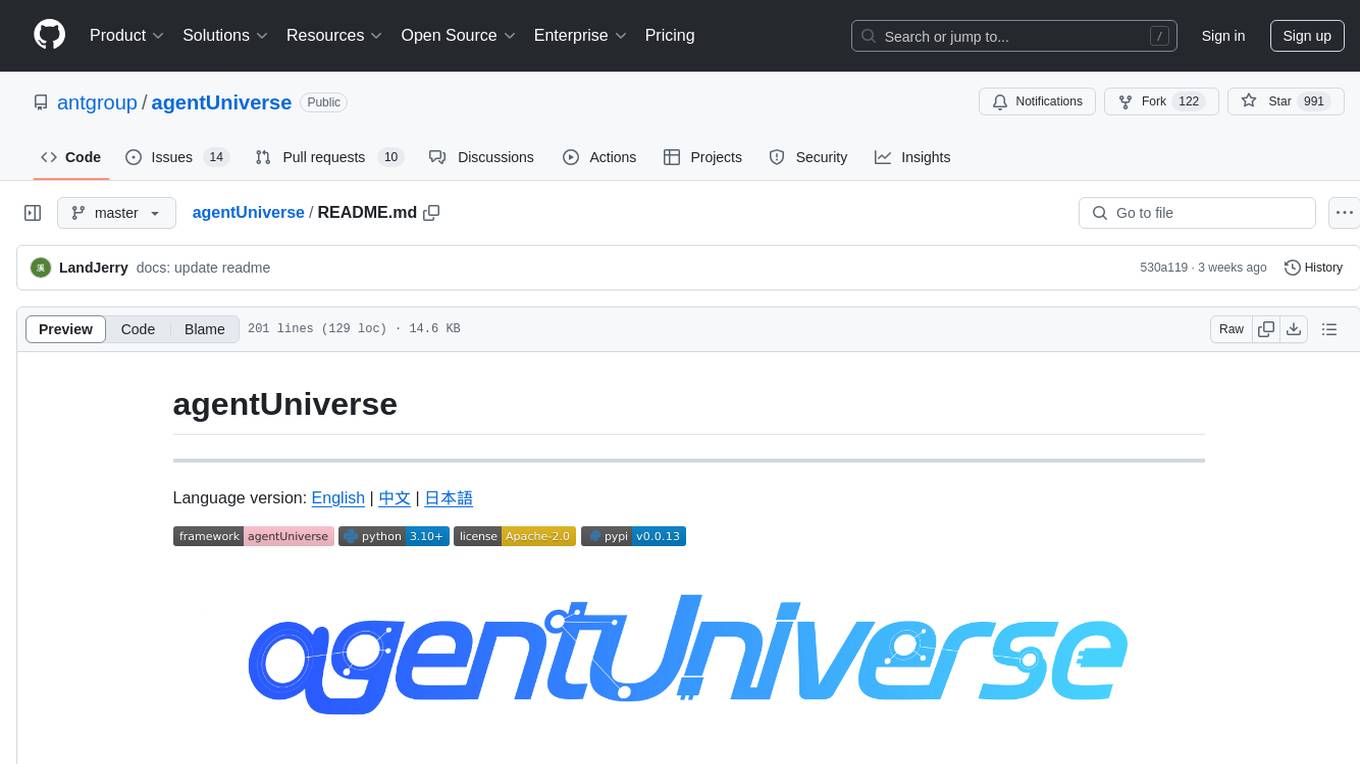
agentUniverse
agentUniverse is a multi-agent framework based on large language models, providing flexible capabilities for building individual agents. It focuses on multi-agent collaborative patterns, integrating domain experience to help agents solve problems in various fields. The framework includes pattern components like PEER and DOE for event interpretation, industry analysis, and financial report generation. It offers features for agent construction, multi-agent collaboration, and domain expertise integration, aiming to create intelligent applications with professional know-how.

agentUniverse
agentUniverse is a multi-agent framework based on large language models, providing flexible capabilities for building individual agents. It focuses on collaborative pattern components to solve problems in various fields and integrates domain experience. The framework supports LLM model integration and offers various pattern components like PEER and DOE. Users can easily configure models and set up agents for tasks. agentUniverse aims to assist developers and enterprises in constructing domain-expert-level intelligent agents for seamless collaboration.
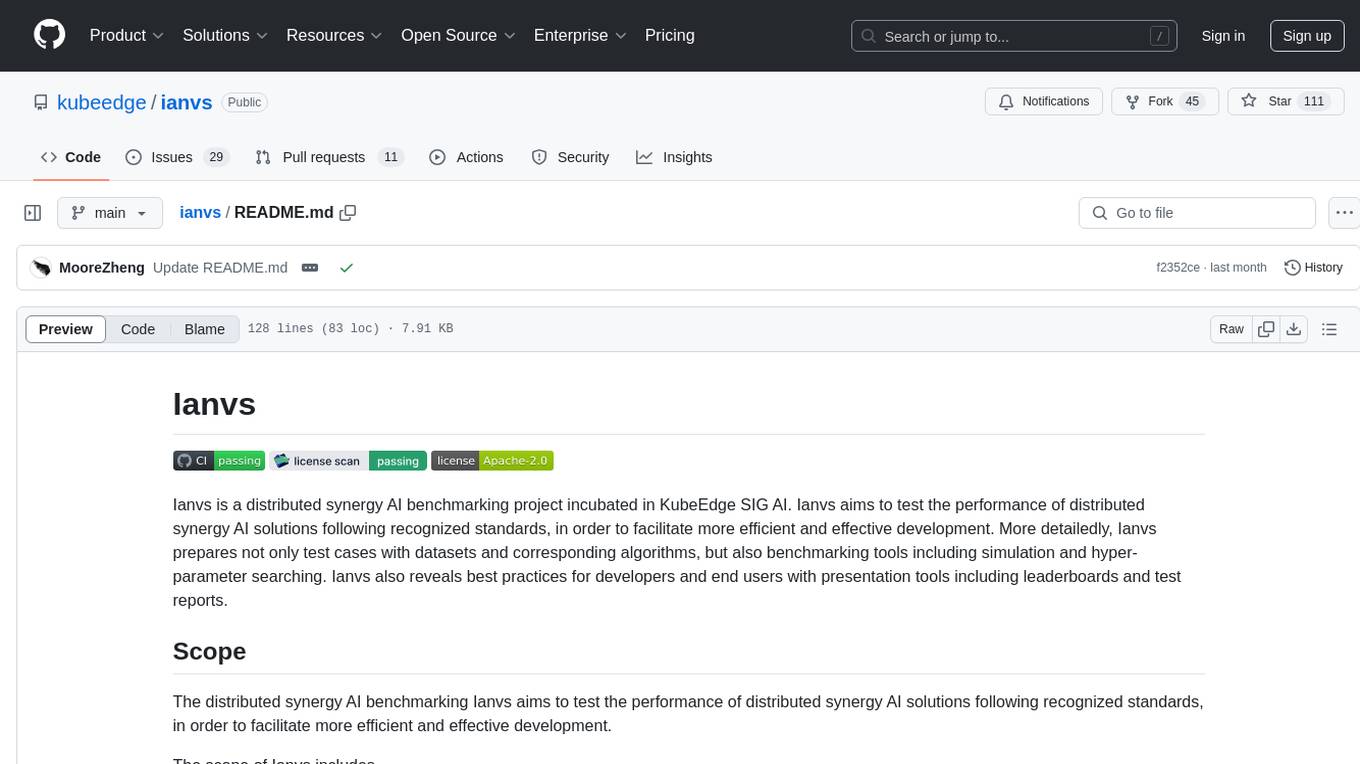
ianvs
Ianvs is a distributed synergy AI benchmarking project incubated in KubeEdge SIG AI. It aims to test the performance of distributed synergy AI solutions following recognized standards, providing end-to-end benchmark toolkits, test environment management tools, test case control tools, and benchmark presentation tools. It also collaborates with other organizations to establish comprehensive benchmarks and related applications. The architecture includes critical components like Test Environment Manager, Test Case Controller, Generation Assistant, Simulation Controller, and Story Manager. Ianvs documentation covers quick start, guides, dataset descriptions, algorithms, user interfaces, stories, and roadmap.
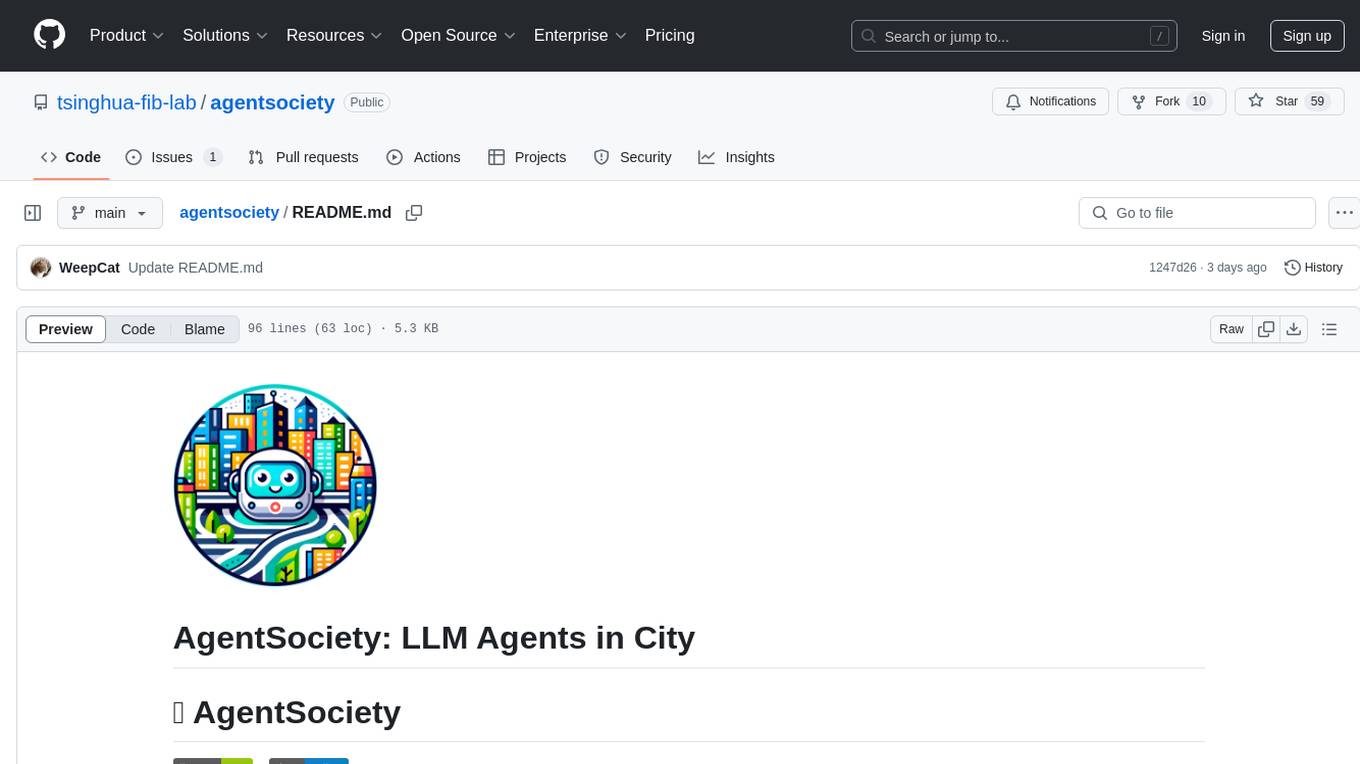
agentsociety
AgentSociety is an advanced framework designed for building agents in urban simulation environments. It integrates LLMs' planning, memory, and reasoning capabilities to generate realistic behaviors. The framework supports dataset-based, text-based, and rule-based environments with interactive visualization. It includes tools for interviews, surveys, interventions, and metric recording tailored for social experimentation.
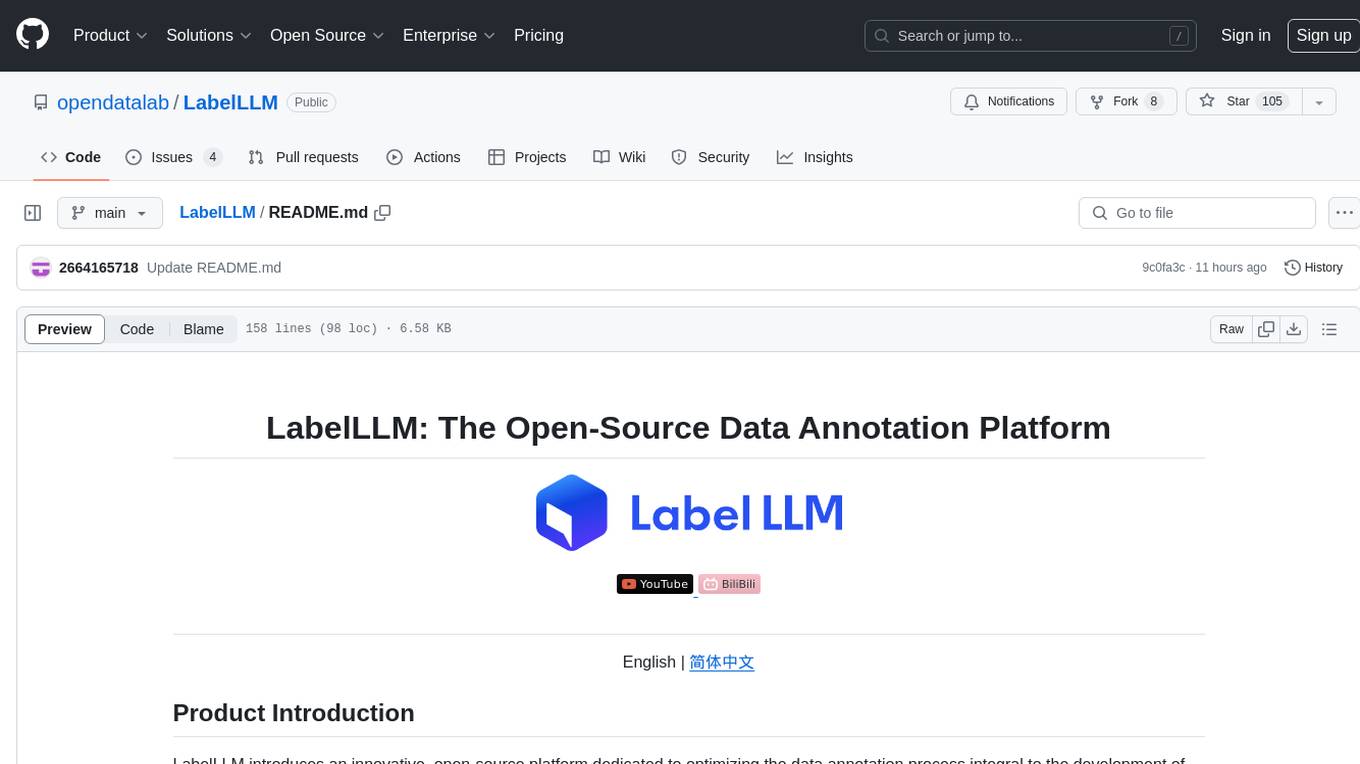
LabelLLM
LabelLLM is an open-source data annotation platform designed to optimize the data annotation process for LLM development. It offers flexible configuration, multimodal data support, comprehensive task management, and AI-assisted annotation. Users can access a suite of annotation tools, enjoy a user-friendly experience, and enhance efficiency. The platform allows real-time monitoring of annotation progress and quality control, ensuring data integrity and timeliness.

AgentUp
AgentUp is an active development tool that provides a developer-first agent framework for creating AI agents with enterprise-grade infrastructure. It allows developers to define agents with configuration, ensuring consistent behavior across environments. The tool offers secure design, configuration-driven architecture, extensible ecosystem for customizations, agent-to-agent discovery, asynchronous task architecture, deterministic routing, and MCP support. It supports multiple agent types like reactive agents and iterative agents, making it suitable for chatbots, interactive applications, research tasks, and more. AgentUp is built by experienced engineers from top tech companies and is designed to make AI agents production-ready, secure, and reliable.
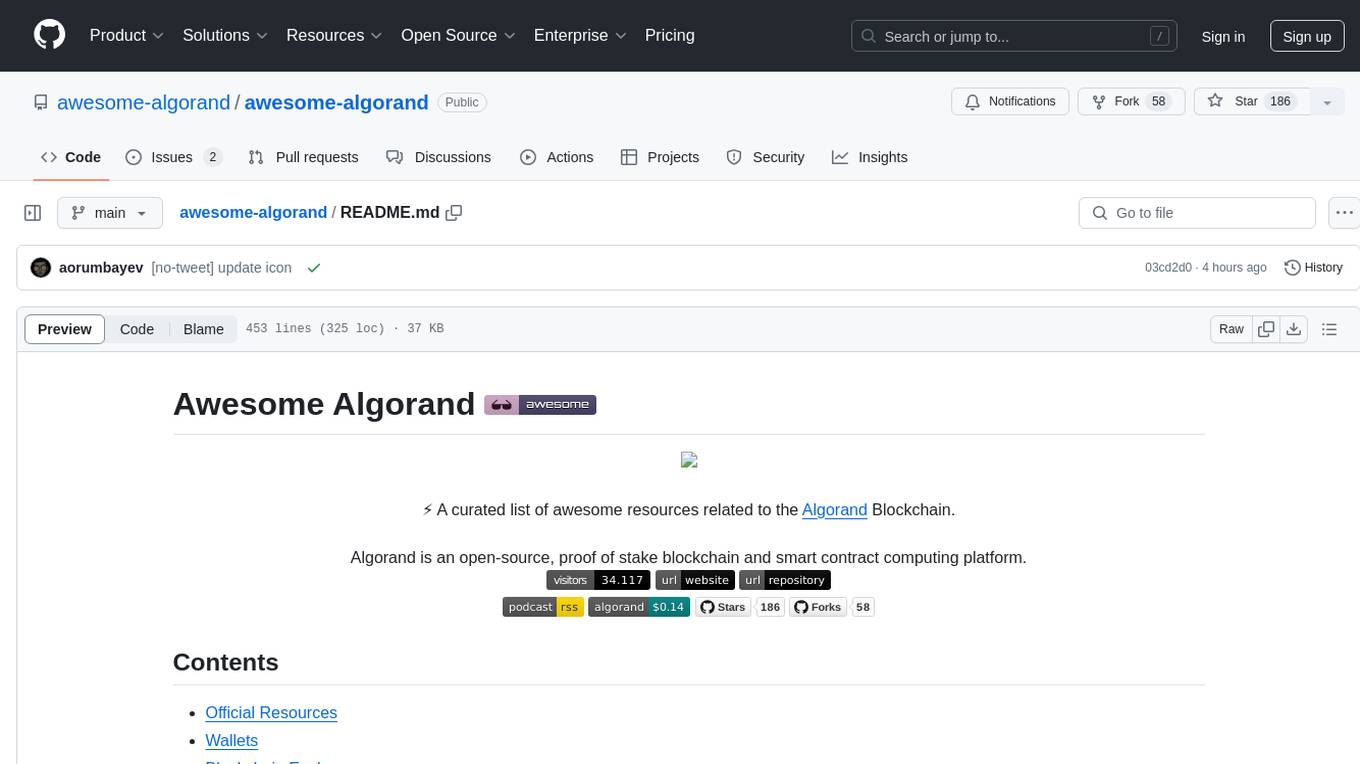
awesome-algorand
Awesome Algorand is a curated list of resources related to the Algorand Blockchain, including official resources, wallets, blockchain explorers, portfolio trackers, learning resources, development tools, DeFi platforms, nodes & consensus participation, subscription management, security auditing services, blockchain bridges, oracles, name services, community resources, Algorand Request for Comments, metrics and analytics services, decentralized voting tools, and NFT marketplaces. The repository provides a comprehensive collection of tools, tutorials, protocols, and platforms for developers, users, and enthusiasts interested in the Algorand ecosystem.
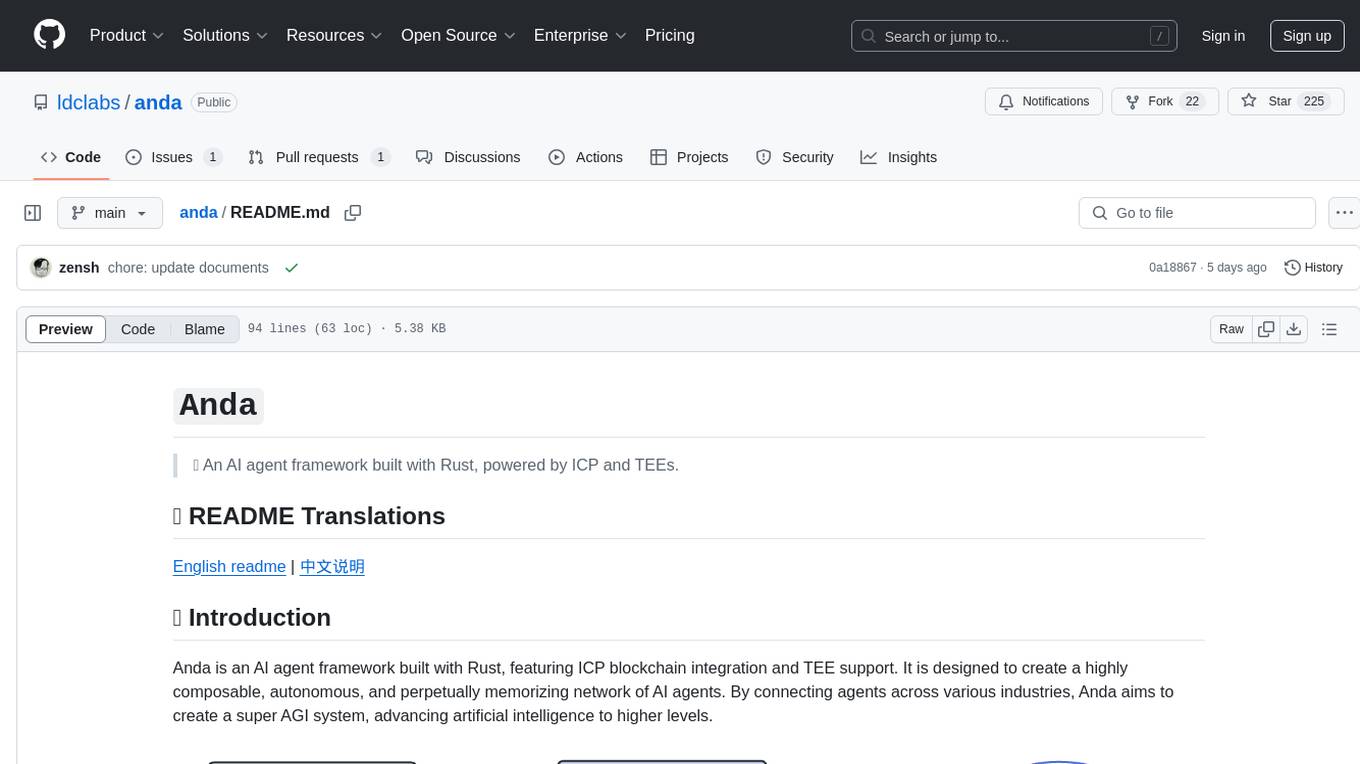
anda
Anda is an AI agent framework built with Rust, integrating ICP blockchain and TEE support. It aims to create a network of highly composable, autonomous AI agents across industries to advance artificial intelligence. Key features include composability, simplicity, trustworthiness, autonomy, and perpetual memory. Anda's vision is to build a collaborative network of agents leading to a super AGI system, revolutionizing AI technology applications and creating value for society.
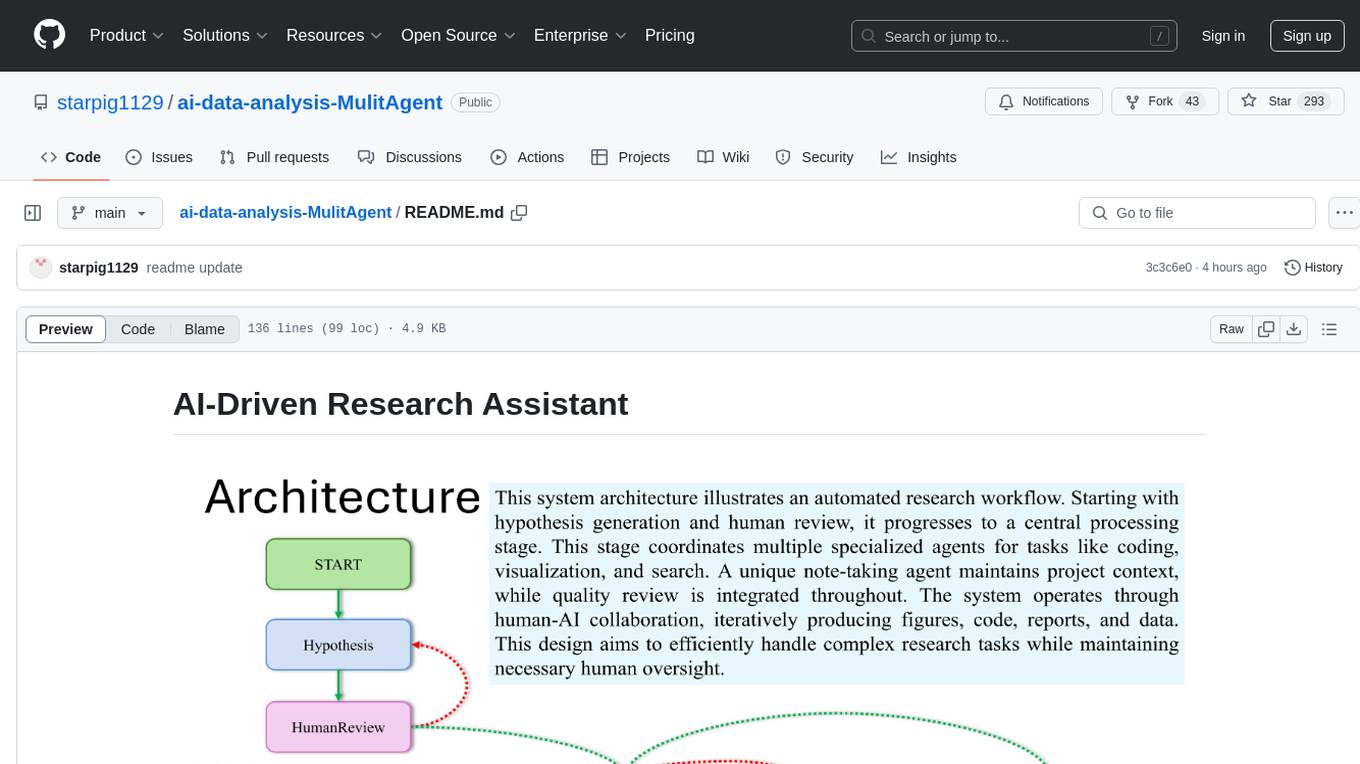
ai-data-analysis-MulitAgent
AI-Driven Research Assistant is an advanced AI-powered system utilizing specialized agents for data analysis, visualization, and report generation. It integrates LangChain, OpenAI's GPT models, and LangGraph for complex research processes. Key features include hypothesis generation, data processing, web search, code generation, and report writing. The system's unique Note Taker agent maintains project state, reducing overhead and improving context retention. System requirements include Python 3.10+ and Jupyter Notebook environment. Installation involves cloning the repository, setting up a Conda virtual environment, installing dependencies, and configuring environment variables. Usage instructions include setting data, running Jupyter Notebook, customizing research tasks, and viewing results. Main components include agents for hypothesis generation, process supervision, visualization, code writing, search, report writing, quality review, and note-taking. Workflow involves hypothesis generation, processing, quality review, and revision. Customization is possible by modifying agent creation and workflow definition. Current issues include OpenAI errors, NoteTaker efficiency, runtime optimization, and refiner improvement. Contributions via pull requests are welcome under the MIT License.
For similar tasks

AgentConnect
AgentConnect is an open-source implementation of the Agent Network Protocol (ANP) aiming to define how agents connect with each other and build an open, secure, and efficient collaboration network for billions of agents. It addresses challenges like interconnectivity, native interfaces, and efficient collaboration. The architecture includes authentication, end-to-end encryption modules, meta-protocol module, and application layer protocol integration framework. AgentConnect focuses on performance and multi-platform support, with plans to rewrite core components in Rust and support mobile platforms and browsers. The project aims to establish ANP as an industry standard and form an ANP Standardization Committee. Installation is done via 'pip install agent-connect' and demos can be run after cloning the repository. Features include decentralized authentication based on did:wba and HTTP, and meta-protocol negotiation examples.

AgentConnect
AgentConnect is an open-source implementation of the Agent Network Protocol (ANP) aiming to define how agents connect with each other and build an open, secure, and efficient collaboration network for billions of agents. It addresses challenges like interconnectivity, native interfaces, and efficient collaboration by providing authentication, end-to-end encryption, meta-protocol handling, and application layer protocol integration. The project focuses on performance and multi-platform support, with plans to rewrite core components in Rust and support Mac, Linux, Windows, mobile platforms, and browsers. AgentConnect aims to establish ANP as an industry standard through protocol development and forming a standardization committee.
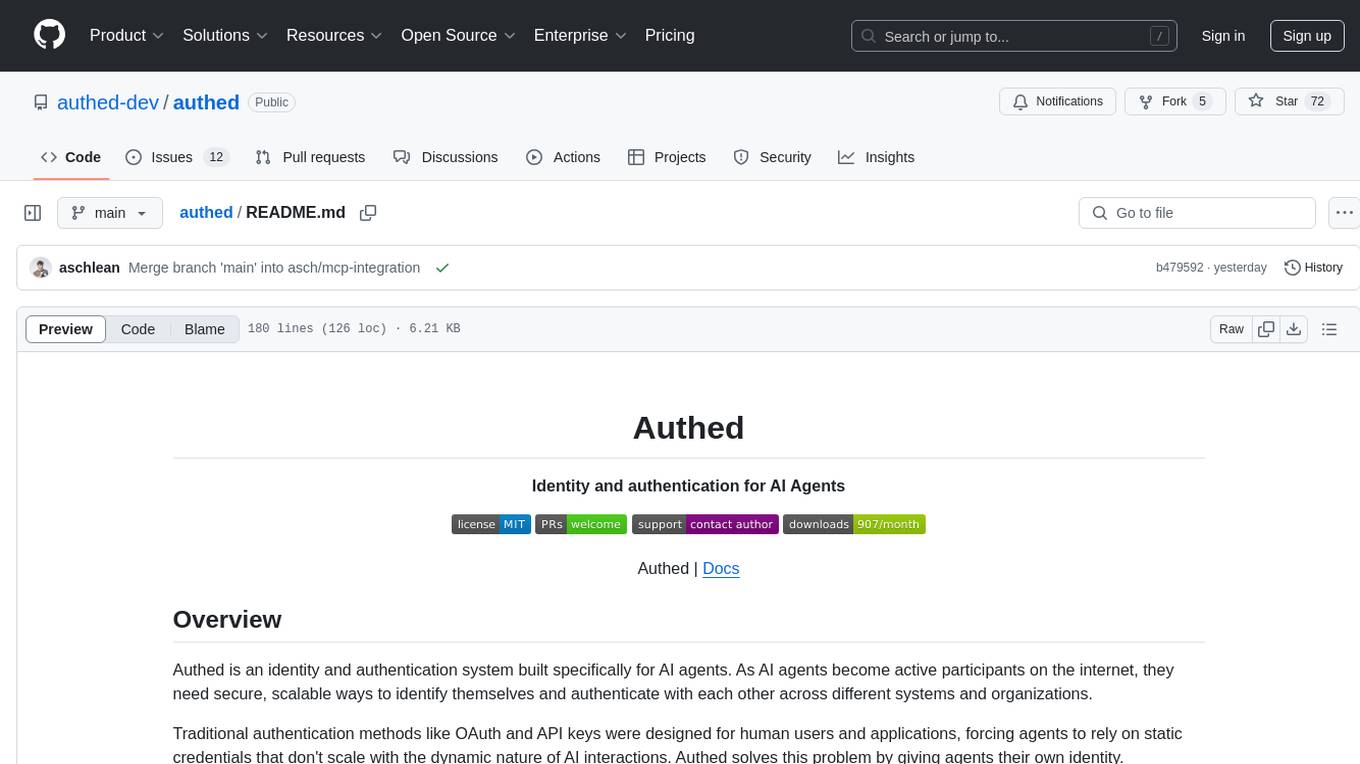
authed
Authed is an identity and authentication system designed for AI agents, providing unique identities, secure agent-to-agent authentication, and dynamic access policies. It eliminates the need for static credentials and human intervention in authentication workflows. The protocol is developer-first, open-source, and scalable, enabling AI agents to interact securely across different ecosystems and organizations.
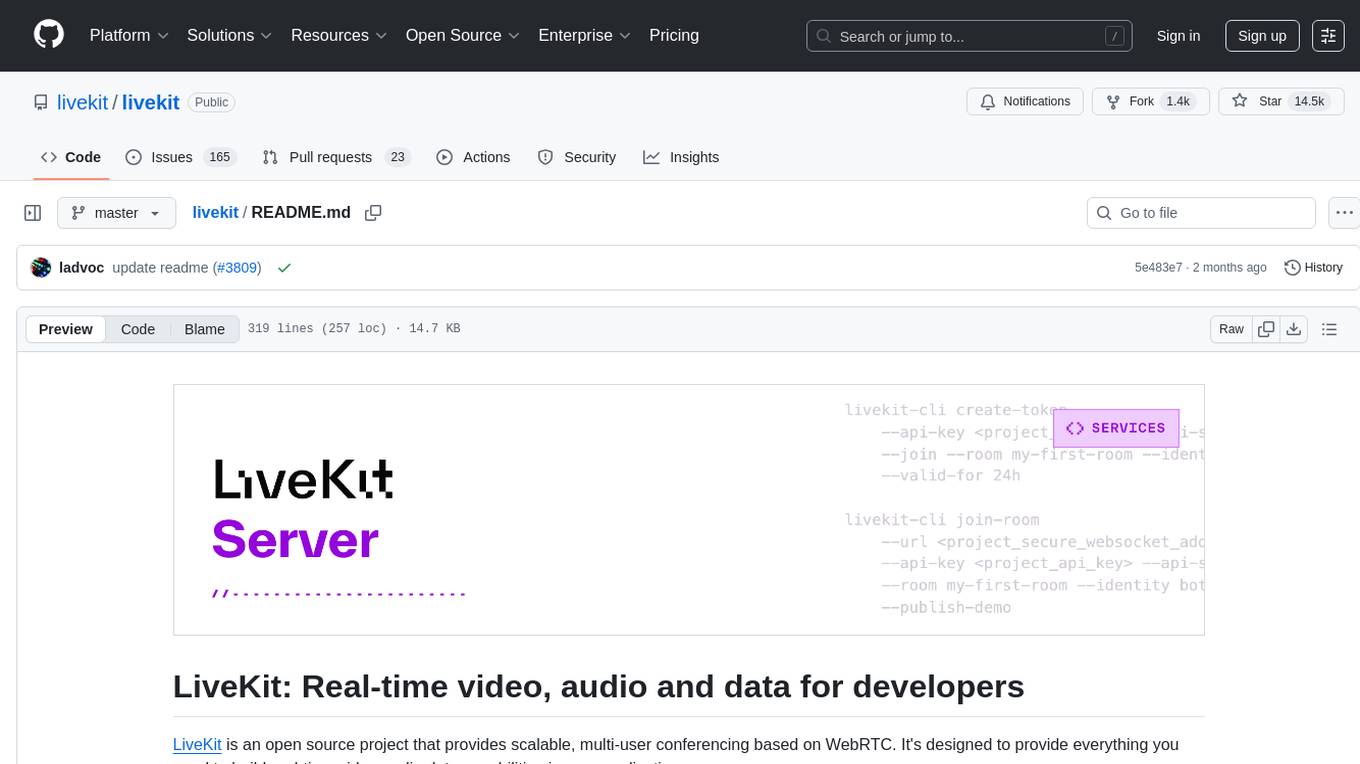
livekit
LiveKit is an open source project providing scalable, multi-user conferencing based on WebRTC. It offers a server written in Go, client SDKs, and advanced features like speaker detection, end-to-end encryption, and SVC codecs. The tool is easy to deploy with support for JWT authentication and robust networking. LiveKit ecosystem includes agents for AI applications, tools like CLI and Docker image, and SDKs for both client and server-side development.

AgentNetworkProtocol
AgentNetworkProtocol (ANP) aims to define how agents connect with each other, building an open, secure, and efficient collaboration network for billions of intelligent agents. It addresses challenges in interconnectivity, native interfaces, and efficient collaboration by providing protocol layers for identity and encrypted communication, meta-protocol negotiation, and application protocol management. The project is developing an open-source implementation available on GitHub, with a vision to become the HTTP of the Intelligent Agent Internet era and establish ANP as an industry standard through a standardization committee. Contact the author Gaowei Chang via email, Discord, website, or GitHub for contributions or inquiries.
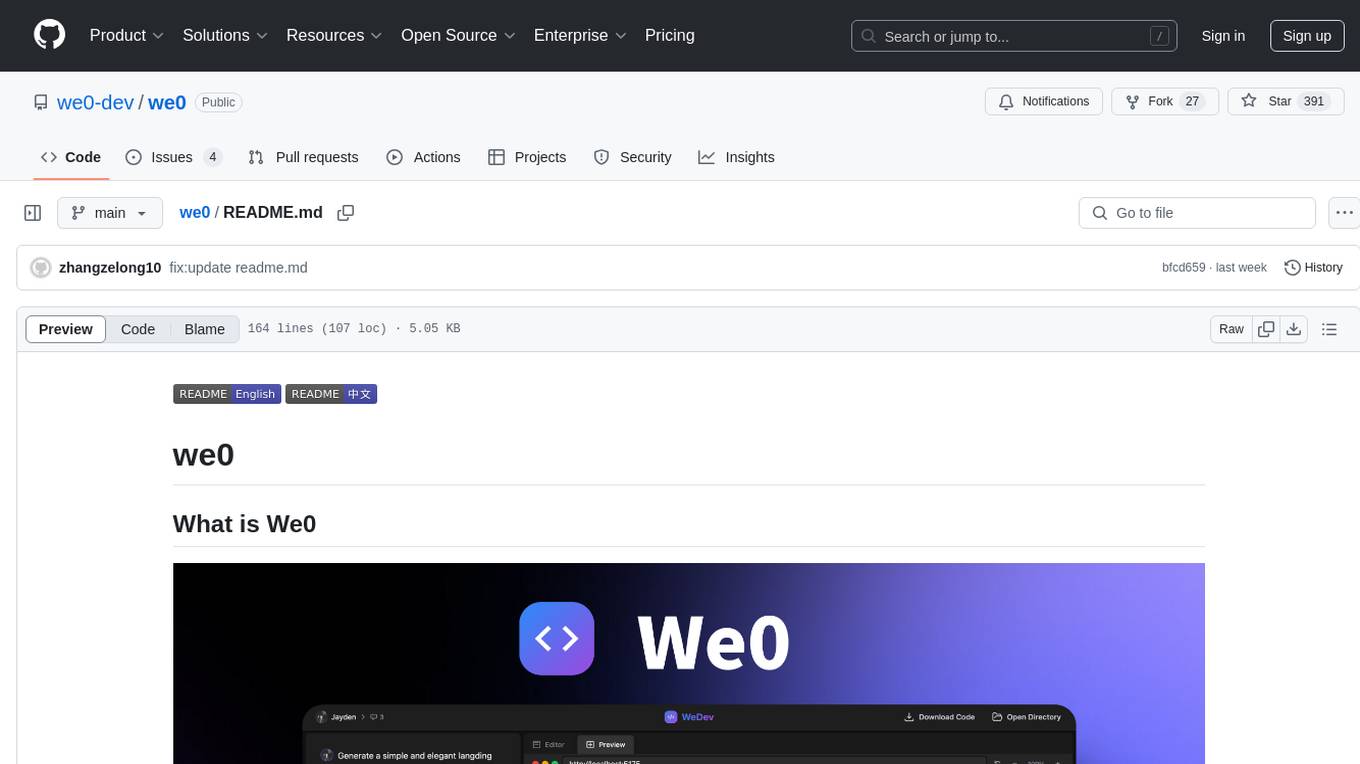
we0
We0 is a web project generation tool that offers browser-based debugging, high-fidelity design restoration, importing historical projects, integration with WeChat Mini Program Developer Tools, and multi-platform support. It supports code generation, design-to-code conversion, open-source projects, WeChat Mini Program Tools preview, existing projects, and Deepseek. The tool uses pnpm as the package management tool and requires Node.js version 18.20. Users can install and configure the tool for web development and utilize quick start methods for building the web editor. Additionally, instructions are provided for installing and using the client version on Mac, along with troubleshooting tips. For any questions or support, users can contact [email protected] or join the WeChat group chat.
For similar jobs

sweep
Sweep is an AI junior developer that turns bugs and feature requests into code changes. It automatically handles developer experience improvements like adding type hints and improving test coverage.

teams-ai
The Teams AI Library is a software development kit (SDK) that helps developers create bots that can interact with Teams and Microsoft 365 applications. It is built on top of the Bot Framework SDK and simplifies the process of developing bots that interact with Teams' artificial intelligence capabilities. The SDK is available for JavaScript/TypeScript, .NET, and Python.

ai-guide
This guide is dedicated to Large Language Models (LLMs) that you can run on your home computer. It assumes your PC is a lower-end, non-gaming setup.

classifai
Supercharge WordPress Content Workflows and Engagement with Artificial Intelligence. Tap into leading cloud-based services like OpenAI, Microsoft Azure AI, Google Gemini and IBM Watson to augment your WordPress-powered websites. Publish content faster while improving SEO performance and increasing audience engagement. ClassifAI integrates Artificial Intelligence and Machine Learning technologies to lighten your workload and eliminate tedious tasks, giving you more time to create original content that matters.

chatbot-ui
Chatbot UI is an open-source AI chat app that allows users to create and deploy their own AI chatbots. It is easy to use and can be customized to fit any need. Chatbot UI is perfect for businesses, developers, and anyone who wants to create a chatbot.

BricksLLM
BricksLLM is a cloud native AI gateway written in Go. Currently, it provides native support for OpenAI, Anthropic, Azure OpenAI and vLLM. BricksLLM aims to provide enterprise level infrastructure that can power any LLM production use cases. Here are some use cases for BricksLLM: * Set LLM usage limits for users on different pricing tiers * Track LLM usage on a per user and per organization basis * Block or redact requests containing PIIs * Improve LLM reliability with failovers, retries and caching * Distribute API keys with rate limits and cost limits for internal development/production use cases * Distribute API keys with rate limits and cost limits for students

uAgents
uAgents is a Python library developed by Fetch.ai that allows for the creation of autonomous AI agents. These agents can perform various tasks on a schedule or take action on various events. uAgents are easy to create and manage, and they are connected to a fast-growing network of other uAgents. They are also secure, with cryptographically secured messages and wallets.

griptape
Griptape is a modular Python framework for building AI-powered applications that securely connect to your enterprise data and APIs. It offers developers the ability to maintain control and flexibility at every step. Griptape's core components include Structures (Agents, Pipelines, and Workflows), Tasks, Tools, Memory (Conversation Memory, Task Memory, and Meta Memory), Drivers (Prompt and Embedding Drivers, Vector Store Drivers, Image Generation Drivers, Image Query Drivers, SQL Drivers, Web Scraper Drivers, and Conversation Memory Drivers), Engines (Query Engines, Extraction Engines, Summary Engines, Image Generation Engines, and Image Query Engines), and additional components (Rulesets, Loaders, Artifacts, Chunkers, and Tokenizers). Griptape enables developers to create AI-powered applications with ease and efficiency.


